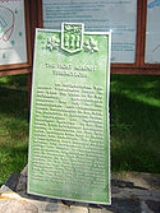
Fort Qu'Appelle, Saskatchewan
Encyclopedia
These figures do not include the substantial population living along the shores of the Fishing Lakes.
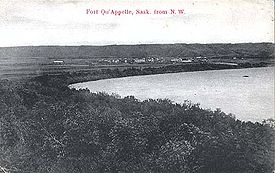 The current site is the third Fort Qu'Appelle. The first was a North West Company
The current site is the third Fort Qu'Appelle. The first was a North West Company
trading post (1801–05), also in the valley but near what is now the Saskatchewan-Manitoba border. The Hudson's Bay Company itself (after the unification of the HBC and the North West Company) first used the name for a post north of present-day Whitewood (some 100 miles east of Regina on Number 1 Highway) from 1813 to 1819.
The current site was a Hudson's Bay Company post from 1852 to 1854 (when an Anglican
mission was established) and again from 1864 to 1911. With the signing of Treaty 4 by Cree and Salteaux aboriginal peoples at Fort Qu'Appelle the North-West Mounted Police, now the RCMP
, arrived and have maintained a continuous presence in the town ever since.
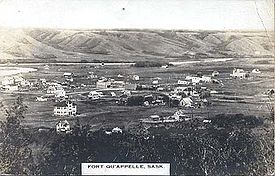 The town's substantial growth beyond its status as a Hudson's Bay Company "factory" first occurred in the 1880s and 1890s when European settlement began in the region as the Canadian Pacific Railway
The town's substantial growth beyond its status as a Hudson's Bay Company "factory" first occurred in the 1880s and 1890s when European settlement began in the region as the Canadian Pacific Railway
moved westwards: a post office opened in 1880. This coincided with the first development of British India after the seizing of control of India from the East India Company by the Crown after the 1857 Indian Mutiny, and the town of Fort Qu'Appelle's striking similarity to the Indian hill stations of the early Raj has been widely commented upon by anyone who has seen both. Older residences and commercial premises together with the town's Anglican and United (formerly Presbyterian) churches are quintessentially of the 19th century hinterland British Empire, a matter which local civic boosters and cultivators of tourism appear not yet to have capitalised upon.
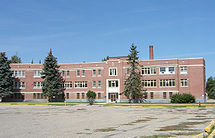 Despite the accelerating decline of rural Saskatchewan in the post-World War II years, the town grew through most of the 1950s and 1960s as a cottage community serving the Qu'Appelle Lakes summer-cottage country in the valley up- and down-river from the town. Cottagers from Regina and other southern Saskatchewan communities used Fort Qu'Appelle as a base from which to explore the scenic and historic river valley, purchase hardware and groceries and contract services; the town also benefited urban drift as farms and other towns steadily depopulated.
Despite the accelerating decline of rural Saskatchewan in the post-World War II years, the town grew through most of the 1950s and 1960s as a cottage community serving the Qu'Appelle Lakes summer-cottage country in the valley up- and down-river from the town. Cottagers from Regina and other southern Saskatchewan communities used Fort Qu'Appelle as a base from which to explore the scenic and historic river valley, purchase hardware and groceries and contract services; the town also benefited urban drift as farms and other towns steadily depopulated.
This process was precipitately accelerated in 1963 when the rural school districts were abolished and farm primary and high school children were thereafter bused to town schools. Rural churches having largely closed in the 1950s, the collapse of rural farming communities was now assured, to the benefit of minor metropoles such as Fort Qu'Appelle though arguably to the impoverishment of the community as a whole.
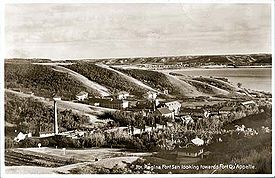 A tuberculosis
A tuberculosis
sanatorium operated by the provincial department of public health under the direction of Dr. R.G. Ferguson opened in 1917 at nearby Fort San
; when tuberculosis ceased to be a public health problem the facility was turned into a fine arts complex where a substantial summer program was operated until the early 1990s when the provincial government terminated its funding.
The former Fort Qu'Appelle Indian Hospital was replaced in 2004 by the All Nations Healing Hospital. The hospital is one of the first health care facilities in Canada owned and operated by First Nation governments. There are sixteen in total, five from Touchwood Agency Tribal Council and eleven from File Hills Qu'Appelle Tribal Council.
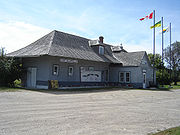 Fort Qu'Appelle is a notable tourist destination both in summer and winter. The lakes afford swimming, boating and other water related activities in summer and cross-country skiing
Fort Qu'Appelle is a notable tourist destination both in summer and winter. The lakes afford swimming, boating and other water related activities in summer and cross-country skiing
, snowmobiling and ice fishing
in winter. There is also Echo Valley Provincial Park
located between Echo Lake and Pasqua Lake. The park provides an RV park
, camping
, swimming
, boating
and fishing
.
The long-closed railway station was originally of the Grand Trunk Pacific Railway
, "incorporated in 1903 as a subsidiary of the Grand Trunk Railway" and "[b]y 1923, [with] the Grand Trunk Railway, and the National Transcontinental merged with the Canadian Northern Railway to form the new Canadian National Railway." "[M]any prairie branch lines closed after 1945; the passenger service was terminated in 1978." The most notable tourist event is Treaty 4
The most notable tourist event is Treaty 4
Gathering, is a week long event celebrating the signing of Treaty #4. The event is held in September, during the week of the 15th. Pow-wow
s are held daily during the week.
The Mission Ridge Ski Hill, located just south of the town near the Treaty 4 Grounds, is open during the winter and is patronised by ski-enthusiasts from the valley and environs and from Regina and elsewhere in the region. On the July long weekend Mission Ridge plays host to Rockin' the Ridge, a one day country/rock music festival.
Recently, Fort Qu'Appelle and area were host to the 2007 Keystone Cup
during April 12–15. The Keystone Cup is the Junior "B" ice hockey championship and trophy for Western Canada. The home town host, Fort Knox hockey club, placed 2nd and won the silver medal in the event. The town accommodated players, coaches, parents, and fans during the event.
Origins

North West Company
The North West Company was a fur trading business headquartered in Montreal from 1779 to 1821. It competed with increasing success against the Hudson's Bay Company in what was to become Western Canada...
trading post (1801–05), also in the valley but near what is now the Saskatchewan-Manitoba border. The Hudson's Bay Company itself (after the unification of the HBC and the North West Company) first used the name for a post north of present-day Whitewood (some 100 miles east of Regina on Number 1 Highway) from 1813 to 1819.
The current site was a Hudson's Bay Company post from 1852 to 1854 (when an Anglican
Anglican Church of Canada
The Anglican Church of Canada is the Province of the Anglican Communion in Canada. The official French name is l'Église Anglicane du Canada. The ACC is the third largest church in Canada after the Roman Catholic Church and the United Church of Canada, consisting of 800,000 registered members...
mission was established) and again from 1864 to 1911. With the signing of Treaty 4 by Cree and Salteaux aboriginal peoples at Fort Qu'Appelle the North-West Mounted Police, now the RCMP
Royal Canadian Mounted Police
The Royal Canadian Mounted Police , literally ‘Royal Gendarmerie of Canada’; colloquially known as The Mounties, and internally as ‘The Force’) is the national police force of Canada, and one of the most recognized of its kind in the world. It is unique in the world as a national, federal,...
, arrived and have maintained a continuous presence in the town ever since.

Canadian Pacific Railway
The Canadian Pacific Railway , formerly also known as CP Rail between 1968 and 1996, is a historic Canadian Class I railway founded in 1881 and now operated by Canadian Pacific Railway Limited, which began operations as legal owner in a corporate restructuring in 2001...
moved westwards: a post office opened in 1880. This coincided with the first development of British India after the seizing of control of India from the East India Company by the Crown after the 1857 Indian Mutiny, and the town of Fort Qu'Appelle's striking similarity to the Indian hill stations of the early Raj has been widely commented upon by anyone who has seen both. Older residences and commercial premises together with the town's Anglican and United (formerly Presbyterian) churches are quintessentially of the 19th century hinterland British Empire, a matter which local civic boosters and cultivators of tourism appear not yet to have capitalised upon.
Development

This process was precipitately accelerated in 1963 when the rural school districts were abolished and farm primary and high school children were thereafter bused to town schools. Rural churches having largely closed in the 1950s, the collapse of rural farming communities was now assured, to the benefit of minor metropoles such as Fort Qu'Appelle though arguably to the impoverishment of the community as a whole.

Tuberculosis
Tuberculosis, MTB, or TB is a common, and in many cases lethal, infectious disease caused by various strains of mycobacteria, usually Mycobacterium tuberculosis. Tuberculosis usually attacks the lungs but can also affect other parts of the body...
sanatorium operated by the provincial department of public health under the direction of Dr. R.G. Ferguson opened in 1917 at nearby Fort San
Fort San, Saskatchewan
Fort San is a former sanatorium, now a resort village, surrounded by the rural municipality of North Qu'Appelle No. 187, Saskatchewan, Canada. The village is located approximately 77 km northeast of Regina and 3 km west of Fort Qu'Appelle...
; when tuberculosis ceased to be a public health problem the facility was turned into a fine arts complex where a substantial summer program was operated until the early 1990s when the provincial government terminated its funding.
The former Fort Qu'Appelle Indian Hospital was replaced in 2004 by the All Nations Healing Hospital. The hospital is one of the first health care facilities in Canada owned and operated by First Nation governments. There are sixteen in total, five from Touchwood Agency Tribal Council and eleven from File Hills Qu'Appelle Tribal Council.
Tourism

Cross-country skiing
Cross-country skiing is a winter sport in which participants propel themselves across snow-covered terrain using skis and poles...
, snowmobiling and ice fishing
Ice fishing
Ice fishing is the practice of catching fish with lines and fish hooks or spears through an opening in the ice on a frozen body of water. Ice anglers may sit on the stool in the open on a frozen lake, or in a heated cabin on the ice, some with bunks and amenities.-Locations:It is a popular pastime...
in winter. There is also Echo Valley Provincial Park
Echo Valley Provincial Park
Echo Valley Provincial Park is a provincial park in Saskatchewan, Canada, located west of the Town of Fort Qu'Appelle in the Qu'Appelle Valley between Echo Lake and Pasqua Lake.-External Links:*...
located between Echo Lake and Pasqua Lake. The park provides an RV park
RV park
A recreational vehicle park or caravan park is a place where people with recreational vehicles can stay overnight, or longer, in alloted spaces known as "pitches"...
, camping
Camping
Camping is an outdoor recreational activity. The participants leave urban areas, their home region, or civilization and enjoy nature while spending one or several nights outdoors, usually at a campsite. Camping may involve the use of a tent, caravan, motorhome, cabin, a primitive structure, or no...
, swimming
Swimming (sport)
Swimming is a sport governed by the Fédération Internationale de Natation .-History: Competitive swimming in Europe began around 1800 BCE, mostly in the form of the freestyle. In 1873 Steve Bowyer introduced the trudgen to Western swimming competitions, after copying the front crawl used by Native...
, boating
Boating
Boating is the leisurely activity of travelling by boat, or the recreational use of a boat whether powerboats, sailboats, or man-powered vessels , focused on the travel itself, as well as sports activities, such as fishing or water skiing...
and fishing
Fishing
Fishing is the activity of trying to catch wild fish. Fish are normally caught in the wild. Techniques for catching fish include hand gathering, spearing, netting, angling and trapping....
.
The long-closed railway station was originally of the Grand Trunk Pacific Railway
Grand Trunk Pacific Railway
The Grand Trunk Pacific Railway was a historical Canadian railway.A wholly owned subsidiary of the Grand Trunk Railway , the GTPR was constructed by GTR using loans provided by the Government of Canada. The company was formed in 1903 with a mandate to build west from Winnipeg, Manitoba to the...
, "incorporated in 1903 as a subsidiary of the Grand Trunk Railway" and "[b]y 1923, [with] the Grand Trunk Railway, and the National Transcontinental merged with the Canadian Northern Railway to form the new Canadian National Railway." "[M]any prairie branch lines closed after 1945; the passenger service was terminated in 1978."

Treaty 4
Treaty 4 was a treaty established between Queen Victoria and the Cree and Saulteaux First Nations. The area covered by Treaty 4 represents most of current day southern Saskatchewan, plus small portions of what are today western Manitoba and southeastern Alberta....
Gathering, is a week long event celebrating the signing of Treaty #4. The event is held in September, during the week of the 15th. Pow-wow
Pow-wow
A pow-wow is a gathering of North America's Native people. The word derives from the Narragansett word powwaw, meaning "spiritual leader". A modern pow-wow is a specific type of event where both Native American and non-Native American people meet to dance, sing, socialize, and honor American...
s are held daily during the week.
The Mission Ridge Ski Hill, located just south of the town near the Treaty 4 Grounds, is open during the winter and is patronised by ski-enthusiasts from the valley and environs and from Regina and elsewhere in the region. On the July long weekend Mission Ridge plays host to Rockin' the Ridge, a one day country/rock music festival.
Recently, Fort Qu'Appelle and area were host to the 2007 Keystone Cup
Keystone Cup
The Keystone Cup is the Junior "B" ice hockey championship and trophy for Western Canada. The Championship is the culmination of the champions of 12 hockey leagues in British Columbia, Alberta, Saskatchewan, Manitoba, and Northwestern Ontario.-History:...
during April 12–15. The Keystone Cup is the Junior "B" ice hockey championship and trophy for Western Canada. The home town host, Fort Knox hockey club, placed 2nd and won the silver medal in the event. The town accommodated players, coaches, parents, and fans during the event.
Education
The town has one high school, Bert Fox Community High School, and one elementary school, Fort Qu'Appelle Elementary Community School. Parklands College is located at the Treaty 4 Governance Centre. Schooling in Fort Qu'Appelle radically expanded immediately after the end of academic year 1962-63 when close-by rural schools, which had pupils from kindergarten to grade 12, universally closed and their attendees were thereafter universally bussed for school to the Fort.Notable people
- HockeyIce hockeyIce hockey, often referred to as hockey, is a team sport played on ice, in which skaters use wooden or composite sticks to shoot a hard rubber puck into their opponent's net. The game is played between two teams of six players each. Five members of each team skate up and down the ice trying to take...
star Eddie ShoreEddie ShoreEdward William Shore was a Canadian professional ice hockey defenceman, principally for the Boston Bruins of the National Hockey League, and the longtime owner of the Springfield Indians of the American Hockey League, iconic for his toughness and defensive skill.Shore won the Hart Trophy as the...
was born in Fort Qu'Appelle. - 1960s folksinger and activist Buffy Sainte-MarieBuffy Sainte-MarieBuffy Sainte-Marie, OC is a Canadian Cree singer-songwriter, musician, composer, visual artist, educator, pacifist, and social activist. Throughout her career in all of these areas, her work has focused on issues of Indigenous peoples of the Americas. Her singing and writing repertoire includes...
(who wrote the protest song "Universal Soldier," has been a regular performer on the U.S. version of "Sesame Street" and is an Officer of the Order of Canada) was born on the Piapot Cree reserve in the Qu'Appelle Valley. - James HendersonJames Henderson (artist)James Henderson is considered to be one of Saskatchewan's pre-eminent first generation artists. Henderson is the subject of a significant retrospective exhibition organized by and first exhibited at the Mendel Art Gallery in 2009...
, "Saskatchewan’s pre-eminent first-generation artist" spent much of his career working in Fort Qu'Appelle. - Nicholas de Grandmaison (1895–1978), the Russian-born Canadian painter, lived for a time in Fort Qu'Appelle, and many of his pictures of aboriginal sitters in traditional dress were done in and around there.
- Dr. Ferguson, Robert George(1883–1964) During his lifetime, Dr. Ferguson guided the province through remarkable achievements in tuberculosis control. Saskatchewan was the first province to provide free treatment of tuberculosis; it was the first to initiate and develop a vaccination program for its sanatorium personnel (nurses) and the Indian population. Known as the BCG inoculation for TB, the #1 health problem in Canada at the time, this treatment was developed by Dr. Ferguson during the late 1930s. Dr. Ferguson headed 'The San' for 31 years until his retirement in 1948.
Media
- The town's community newspaper the Fort Qu'Appelle Times is released every Tuesday.
- The community radio station, "Voice of the Valley," operates at 88.3 FM.
- The town has 3 television re-transmitters. The transmitters are used by CBCCanadian Broadcasting CorporationThe Canadian Broadcasting Corporation, commonly known as CBC and officially as CBC/Radio-Canada, is a Canadian crown corporation that serves as the national public radio and television broadcaster...
(channel 4), GlobalGlobal Television NetworkGlobal Television Network is an English language privately owned television network in Canada, owned by Calgary-based Shaw Communications, as part of its Shaw Media division...
(channel 6), and CTVCTV television networkCTV Television Network is a Canadian English language television network and is owned by Bell Media. It is Canada's largest privately-owned network, and has consistently placed as Canada's top-rated network in total viewers and in key demographics since 2002, after several years trailing the rival...
(channel 7).
Television and film location
- The movie Skipped PartsSkipped PartsSkipped Parts , is a movie based on Tim Sandlin's book of the same name. Skipped Parts is the first in a series of novels based on the lives of Maury and Sam, the second and final being Sorrow Floats and Social Blunders. The film is about a group of characters living in a small Wyoming town...
had scenes filmed in Fort Qu'Appelle and in nearby towns as well as the city of ReginaRegina, SaskatchewanRegina is the capital city of the Canadian province of Saskatchewan. The city is the second-largest in the province and a cultural and commercial centre for southern Saskatchewan. It is governed by Regina City Council. Regina is the cathedral city of the Roman Catholic and Romanian Orthodox... - The CBCCanadian Broadcasting CorporationThe Canadian Broadcasting Corporation, commonly known as CBC and officially as CBC/Radio-Canada, is a Canadian crown corporation that serves as the national public radio and television broadcaster...
movie Betrayed was filmed primarily in Fort Qu'Appelle, with notable sites including the old hospital (both in and out). - The television series Life Without Borders is filmed and produced in the Fort Qu'Appelle area.
External links
- Community website - History of Fort Qu'Appelle
- University of Saskatchewan Library: postcard views of the Qu'Appelle Valley at the turn of the 20th century
- http://esask.uregina.ca/entry/fort_quappelle.html Encyclopedia of Saskatchewan

